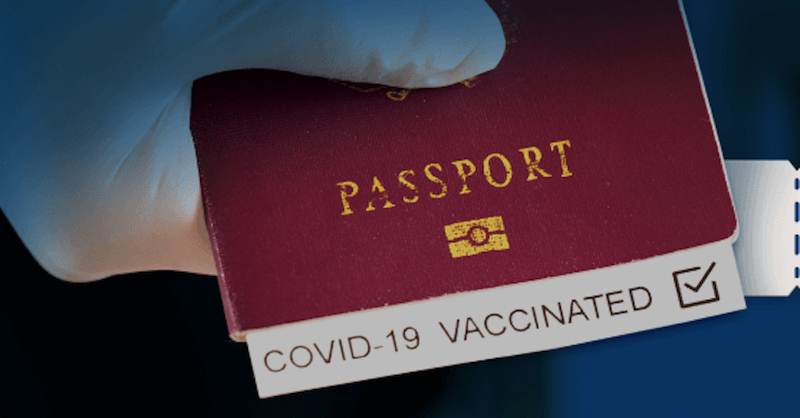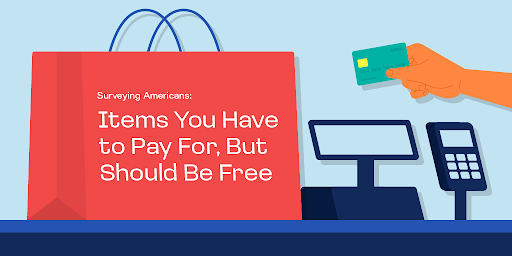The next time someone asks us for ID, it may not be our driver’s license we reach for but instead a vaccine passport that proves we’ve received a shot. While the idea is still in its infancy stage, governments around the world have shown interest in it and are working on implementing quicker and more efficient ways to prove someone’s been vaccinated.
We’ve surveyed over 1,000 people to get their takes on this latest political controversy surrounding the pandemic. Respondents were asked if they were for or against the concept of vaccine passports; reflected on some ethical issues that might arise when they are rolled out; and discussed reasons why they may or may not get vaccinated in general. We’ve used variables such as age and political affiliation to help flesh out and expand on the findings. Read on to find out more!
Opposing Views
People were very split on the vaccine passport debate – half of Americans felt them necessary to fight against the pandemic, and women and Democrats were more likely to support the idea of them than men and Republicans were. In total, 60.6% of respondents (of which over three-quarters had already been vaccinated) supported the idea, compared to 28% who didn’t, while the rest were impartial. According to a recent Pew Research Center survey, Democrats were twice as likely to believe the COVID-19 outbreak is a major threat to the American population. Seeing as Republicans were far less worried about it, their heightened disinterest in vaccine passports makes sense.
Taking a closer look at political affiliation, 74% of Democrats were on board with vaccine passports, and only 13.7% were opposed, but Republicans were quite split on the matter, with 49.8% for and 44.3% against them – conservatives were three times more likely to oppose the idea than those who were leftward-leaning. If vaccine passports were to be implemented, 37.1% of respondents would be more likely to get vaccinated, with Democrats being a little more willing to than Republicans. Generationally, Gen Xers were less enthused about vaccine passports than baby boomers and millennials.
Vaccine passports aside, two-thirds of respondents thought it was anywhere between somewhat and extremely important for people to need proof of vaccination in order to take part in certain public activities. On top of that, the Centers for Disease Control and Prevention (CDC) already recommends practicing preventative actions when in public, like keeping a face mask, tissue, and hand sanitizer on you at all times. Just over a quarter thought needing proof of vaccination was inappropriate on some level, and the rest had no opinion. Again, Democrats were more in favor of needing vaccination evidence, and Republicans were not. Two-thirds of respondents believed that vaccines were very effective in the fight against COVID-19. Democrats and people already vaccinated agreed with this sentiment more than Republicans and people that hadn’t been vaccinated.
Even if vaccine passports could be stored on your phone, well over half of respondents wouldn’t change their stance on them, but just under a third would be more likely to support the idea – 1 in 3 millennials as well as Democrats fell into this category. Just over half of respondents also wouldn’t be influenced if tech companies managed vaccine passports, but 30.3% would be less likely to support their implementation if that was the case.
Gray Areas
Next, respondents were asked what they felt uneasy about in terms of a potential vaccine passport rollout. Among those refusing to get vaccinated, 76.8% were worried about being denied participation in certain activities. Overall, the most glaring issue was that it would be unfair to people who are unable to get vaccinated. As of now, all states have opened up vaccinations to people aged 16 or over. Forty-five percent of people were also worried about the potential of others using fraudulent documentation, and 44.8% weren’t too keen on sharing their personal medical information. The rest thought it would be unfair for people without proper documentation and were worried about their data security.
Regarding political affiliations, Republicans also were wary about keeping their medical information private and data security. Democrats were more concerned with the likelihood of fraud and were more passionate about the fact that people without proper documentation might have trouble getting vaccinated. That being said, the Department of Homeland Security released a statement saying that undocumented immigrants will have equal opportunities to get a vaccine.
Generally, baby boomers were more concerned with fraud and data security than Gen Xers and millennials. Men were more likely to be concerned about data security (35%) and being denied certain activities (26%), compared to women (29% and 20%, respectively).
Anti-Vaxxer Sentiment
In terms of how many people had actually gotten vaccinated, 55% already were or were planning to, just under a quarter said they probably will, and the rest either probably or definitely would not. The top two reasons as to why people were straying from vaccination were due to potential long-term and short-term effects. Many also believed the vaccines were developed too quickly and didn’t have enough clinical trials to be deemed safe. The CDC highly encourages people to get a vaccine once they are eligible and ensures the safety and effectiveness of them. While side effects can occur, they are common and should not cause panic. There have been a few cases of people having serious allergic reactions, but vaccination providers are equipped with the necessary medicine to immediately and effectively treat them. They’ve also stated that long-term effects are extremely rare and unlikely.
Regarding nearly all the aforementioned reasons why people might skip the vaccine, Republicans felt stronger about them than Democrats did. Democrats, however, were slightly more likely to believe the conspiracy that vaccines are just a scam to make people in high places more money.
Wanting the Shot
On the other hand, respondents outlined the top benefits of getting vaccinated. People seemed to miss traveling a lot, as 57% would be more apt to get a vaccine if it meant they could do so. Many longed for their family and friends and would very much like to gather indoors with them as soon as possible. Most of the other motivations revolved around other activities like going out with friends and attending events. In fact, 1 in 3 millennials thought about getting vaccinated just to attend indoor concerts, and 32% were also considering the benefit of being able to go to indoor sporting events, bars, and clubs.
Lastly, we asked vaccinated and unvaccinated individuals about the activities they would be comfortable doing currently. People who’d gotten the vaccine would be more comfortable seeing their families both indoors and outdoors, eating at restaurants outdoors, and going shopping. People who hadn’t gotten the shot would surprisingly be more willing to partake in some very high-risk activities than those who’d received one. With cases ramping up all over the world, hopping on a plane and leaving the country is not recommended at this time, especially if you’re vaccine-free.
Passport, Please
With the idea of vaccine passports coming into the picture, many people are split on whether they’d support them. Generally, Republicans were more skeptical about both the passports and the vaccines in general. Seeing as they were less inclined to receive a vaccine due to health-related worries, they also wondered if they would be much more confined in terms of living freely, compared to those who were vaccinated and had a passport to prove it.
That aside, many were quick to admit they would get a vaccine so they could recoup some normalcy in their life. And while people are eager to live their life to the fullest, it’s important to not jump the gun, for all of our sakes. Speaking of safety, USARx.com is the best place to check for all of your health-related needs. As a comprehensive health marketplace, not only can you find the medicine that you’re looking for, but most likely at a discount as well. For health advice, medical information, and a wide variety of prescription deals, head there now to see what’s in store for you.
Methodology and Limitations
We surveyed 1,014 on their sentiments of vaccine passports. Among them, 54.9% were men, 44.9% were women, and 0.2% preferred not to answer. Respondent ages ranged from 24 to 64 years old with an average age of 38.
For short, open-ended questions, outliers were removed. To help ensure that all respondents took our survey seriously, they were required to identify and correctly answer an attention-check question.
These data rely on self-reporting by the respondents and are only exploratory. Issues with self-reported responses include but aren’t limited to exaggeration, selective memory, telescoping, attribution, and bias. All values are based on estimation.
Fair Use Statement
Vaccine passports could be right around the corner. If you have any friends or family that might be interested in learning more about their implications and the general population’s sentiment toward them, feel free to send this article their way. We just ask that you do so for noncommercial use only and to provide a link back to the original page so contributors can earn credit for their work.
Go to Source
Go to Source
Owner, entrepreneur, and health enthusiast.
Chris is one of the Co-Founders of USARx.com. An entrepreneur at heart, Chris has been building and writing in consumer health for over 10 years. In addition to USARx.com, Chris and his Acme Health LLC Brand Team own and operate Pharmacists.org and the USA Rx Pharmacy Discount Card.
Chris has a CFA (Chartered Financial Analyst) designation and is a proud member of the American Medical Writer’s Association (AMWA), the International Society for Medical Publication Professionals (ISMPP), the National Association of Science Writers (NASW), the Council of Science Editors, the Author’s Guild, and the Editorial Freelance Association (EFA).
Our growing team of healthcare experts work everyday to create accurate and informative health content in addition to the keeping you up to date on the latest news and research.
How we built this article:
- Content Process
- Article History
Every piece of content we produce is meticulously crafted and edited based on the four core pillars of our editorial philosophy: (1) building and sustaining trust; (2) upholding the highest journalistic standards; (3) prioritizing accuracy, empathy, and inclusivity; and (4) continuously monitoring and updating our content. These principles ensure that you consistently receive timely, evidence-based information.
Current Version
2023-01-19
Edited By
Chris Riley
2022-11-09
Fact Checked By
Camille Freking, M.S
2022-08-18
Reviewed By
Nam Tran PharmD
2022-04-15
Written By
Chris Riley
VIEW ALL HISTORY +













